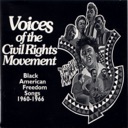Freedom Songs
Civil Rights March on Washington, D.C. Vocalists Peter, Paul, and Mary on stage.
U.S. National Archives and Records AdministrationKey Attributes of Freedom Songs
Select to filter timelineThemes
- Political Issues/Activism
- Black Power/Pride
- Freedom
- Racism/Discrimination
- Social Consciousness
Musical Features
- Ballad
- Hymns
- Ensemble
Instruments
- Voice
“The core of freedom song repertoire was formed from the reservoir of traditional songs and older styles of [religious] singing. This music base was expanded to include most of the popular secular and sacred music forms and singing techniques of the 1950s and 1960s.”Bernice Johnson ReagonSinger & Civil Rights Activist
The Civil Rights movement was a “singing movement.” In the 1950s, African American churches hosted community groups that organized mass protest activities against racial segregation in the South. The tradition of congregational singing led by strong song leaders soon extended to choirs, small ensembles, and soloists who sang in mass meetings, marches, and in jails. Their repertoire was called Civil Rights freedom songs, also known as protest songs.
Context and History
The modern Civil Rights and Black Power movements emerged from an era of social unrest in the mid-1950s when African Americans from the South mounted a series of grassroots activities to protest their social status as second-class citizens. These activities gained widespread momentum and spread to the North, attracting national attention in the 1960s. Music was integral to both movements and served a multitude of functions. It galvanized African Americans into political action; provided strength and courage; united protesters as a cohesive group; and became a creative medium for mass communication.
Participation in the Civil Rights movement crossed generational, professional, and racial boundaries. The musical repertoire reflected this diversity, consisting of original versions and new interpretations of spirituals, hymns, ballads, gospel, rhythm and blues, and soul music, as well as original creations. For example, at a meeting of the Student Nonviolent Coordinating Committee (SNCC) in Atlanta in 1964, members of the Freedom Singers led protesters in a medley consisting of both contemporary and traditional songs, “Freedom Medley: Freedom Chant/Oh Freedom/This Little Light of Mine” and “Lord Hold My Hand While I Run This Race,” which came from the repertoire of a rural Baptist church congregation. The younger generation reinterpreted and created new songs in the traditions of the jubilee concert spiritual and gospel quartet (“Oh Prichett, Oh Kelly” and “In the Mississippi River” by the Freedom Singers). They also sang contemporary gospel songs, rhythm and blues, and soul music, which they turned into freedom songs such as “Get Your Rights, Jack” by the CORE Freedom Singers based on Ray Charles’s “Hit the Road, Jack” (1961). The updated versions of these songs captured the energy of the movement and the prevailing message of freedom.
Other well-known freedom songs include “We Shall Overcome,” theme song of the movement and now an international anthem for freedom and resistance; “Come Bah Yah” (also known as “Kumbaya,” and derived from the spiritual “Come By Here”), “Ain’t Gonna Let Nobody Turn Me Around” (spiritual), “99½ Won’t Do” (gospel), and “Calypso Freedom” (Caribbean calypso). During the folk revival of the 1960s, many white and Black folk singer-songwriters began writing and/or performing protest and Civil Rights songs, including Peter Seeger (“If I Had a Hammer,” written with Lee Hays from the Weavers), Tom Paxton, Bob Dylan (“Blowin’ in the Wind”), Odetta, Richie Havens, Len Chandler, Phil Ochs, Joan Baez, and the group Peter, Paul and Mary. The power of the freedom struggle, in the 1960s and beyond, directly impacted the work of many musicians working in vernacular, jazz, and popular/commercial genres, including Taj Mahal, Harry Belafonte, Miriam Makeba, Sweet Honey in the Rock, Mahalia Jackson, Nina Simone, Ray Charles, Max Roach, Charlie Mingus, Randy Weston, Art Blakey, John Coltrane, Ornette Coleman, Thelonious Monk, Miles Davis, Sonny Rollins, and Olatunji.
Musical Features/Performance Style
Songs were performed in a variety of familiar modes: spirituals and ballads, gospel-hymns, traditional and modern gospel, or lined hymn (an older style of singing in which the congregation repeats each line sung by the leader). Other examples embody rhythm and blues, soul, and calypso. Well-known melodies were often adapted to fit new texts.
Lyrics
The themes of freedom and empowerment, and the rejection of second-class citizenship and cruel treatment by the police, dominate the texts of freedom songs. The lyrics and melodies of folk spirituals, folk ballads, hymns, gospel, and popular songs were adapted to reflect the issues of the situation at hand and the protestor’s vision for social and political change.
Bibliography
- Reagon, Bernice Johnson. “The Civil Rights Period: Music as an Agent of Social Change.”
- Issues in African American Music: Power, Gender, Race, Representation. Portia K. Maultsby and Mellonee V. Burnim, eds. New York. Routledge Press, 2016, 343-380.













